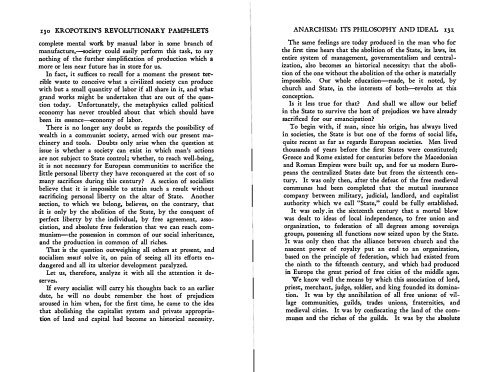Kropotkin's Revolutionary Pamphlets - Libcom
Kropotkin's Revolutionary Pamphlets - Libcom
Kropotkin's Revolutionary Pamphlets - Libcom
You also want an ePaper? Increase the reach of your titles
YUMPU automatically turns print PDFs into web optimized ePapers that Google loves.
X30 KROPOTKIN'S REVOLUTIONARY PAMPHLETS<br />
complete mental work by manual labor in some branch of<br />
manufacture,--society could easily perform this task, to say<br />
nothing of the further simplification of production which a<br />
more or less near future has in store for· us.<br />
In fact, it suffices to recall for a moment the present terrible<br />
waste to conceive what a civilized society can produce<br />
with but a small quantity of labor if all share in it, and what<br />
grand works might be undertaken that are out of the question<br />
today. Unfortunately, the metaphysics called political<br />
economy has never troubled about that which should have<br />
been its essence--economy of labor.<br />
There is no longer any doubt as regards the possibility of<br />
wealth in a communist society, armed with our present machinery<br />
and tools. Doubts only arise when the question at<br />
issue is whether a society can exist in which man's actions<br />
are not subject to State control ; whether, to reach well-being,<br />
it is not necessary for European communities to sacrifice the<br />
little personal liberty they have reconquered at the cost of so<br />
many sacrifices during this century? A section of socialists<br />
believe that it is impossible to attain such a result without<br />
sacrificing personal liberty on the altar of State. Another<br />
section, to which we belong, believes, on the contrary, that<br />
it is only by the abolition of the State, by the conquest of<br />
perfect liberty by the individual, by free agreement, assodation,<br />
and absolute free federation that we can reach communism-the<br />
possession in common of our social inheritance.<br />
and the production in common of all riches.<br />
That is the question outweighing all others at present, and<br />
socialism must solve it, on pain of seeing all its efforts endangered<br />
and all its ulterior development paralyzed.<br />
Let us, therefore, analyze it with all the attention it deserves.<br />
If every socialist will carry his thoughts back to an earlier<br />
date, he will no doubt remember the host of prejudices<br />
aroused in him when, for the first time, he came to the idea<br />
that abolishing the capitalist system and private appropriation<br />
of land and capital had become an historical necessity.<br />
ANARCHISM: ITS PHILOSOPHY AND IDEAL 131<br />
The same feelings are today produced in the man who for<br />
the first time hears that the abolition of the State its laws. its<br />
entire system of management. governmentalism and centra<br />
ization, also becomes an historical necessity: that the aboh<br />
tion of the one without the abolition of the other is materially<br />
impossible. Our whole education-made. be it noted, b !<br />
church and State, in the interests of both---i'evolts at thIS<br />
conception.<br />
.<br />
Is it less true for that? And shall we allow our belIef<br />
in the State to survive the host of prejudices we have already<br />
sacrificed for our emancipation?<br />
To begin with. if man, since his origin, has always lived<br />
in societies, the State is but one of the forms of social life,<br />
quite recent as far as regards European societies. Me r:-<br />
lived<br />
thousands of years before the first States were constltuted;<br />
Greece and Rome existed for centuries before the Macedonian<br />
and Roman Empires were built up. and for us modern Europeans<br />
the centralized States date but from the sixteenth century.<br />
It was only then, after the defeat of the free medIeval .<br />
communes had been completed that the mutual insurance<br />
company between military, judicial, landlord, and captalist<br />
authority which we call "State," could be fully estabhshed.<br />
It was only in the sixteenth century that a mortal blow<br />
was dealt to ideas of local independence, to free union and<br />
organization, to federation of all degrees among sovereign<br />
groups, possessing all functions now seized upon by the State.<br />
It was only then that the alliance between church and the<br />
nascent power of royalty put an end to an organization,<br />
based on the principle of federation, which had existed from<br />
the ninth to the fifteenth century, and which had produced<br />
in Europe the great period of free cities of the middle ages.<br />
We know well the means by which this association of lord,<br />
priest, merchant, judge, soldier. and king founded its domination.<br />
It was by the annihilation of all free unions: of village<br />
communities, guilds, trades unions. fraternities. and<br />
medieval cities. It was by confiscating the land of the communes<br />
and the riches of the guilds. It was by the absolute

















